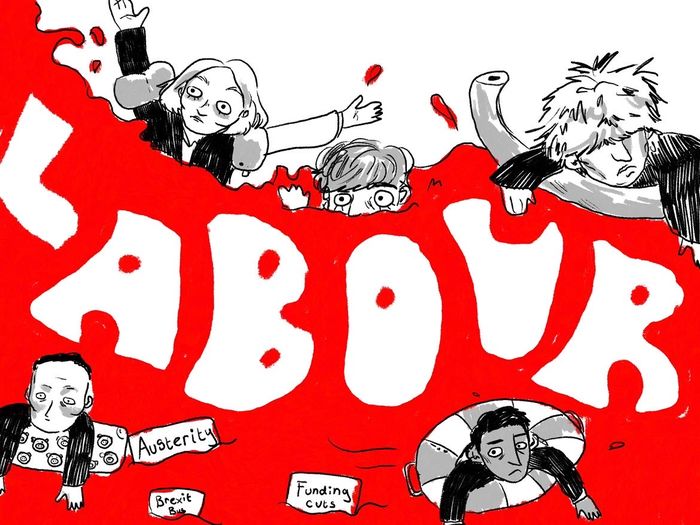Can Labour win the fight against factionalism and unite the country? I’m not so sure…
Lili Fairclough takes stock of the obstacles the Labour Party face and casts doubt on Starmer’s ability to get past them

In his first speech post-election, Starmer appealed to all Britons and set out his aim to unite the country. On the surface at least, it appears as though we are united. A historic majority of 411 seats suggests that the public is done with Conservative chaos, and have decisively backed Labour. This result also bodes well for passing legislation, free from the defections and defiances of party whip that have characterised recent years.
However, a closer look at the election results, and the climate leading up to July 4th suggests a more fractured picture of the country, and one that could be moving closer to, rather than away from, division, disillusionment, and chaos. This challenge of creating unity is one of many that the new government faces, and one that it must fight from many sides.
“Reform […] are breathing down Labour’s necks in almost 100 constituencies”
Firstly, Reform Ltd has been established as a party with 5 seats in the new Parliament. Despite being a small presence in the Commons, Farage has vowed to “change politics forever”, and has argued that Reform will win the next General Election in 2029. And these 5 seats are only the tip of the light-blue iceberg. Reform came 2nd in over 95 seats, the vast majority in now Labour seats, and their vote share beats that of the Lib Dems. Whilst their chances of directly affecting policy in this parliament seem unlikely, they are breathing down Labour’s necks in almost 100 constituencies, and some MPs could be pushed towards more right-wing policies in an effort to protect their seats. Furthermore, Farage has been strongly endorsed by Donald Trump, which is all the more worrying depending on how November’s US election plays out, and could see a powerful world leader adding fuel to the fire of right-wing extremism here.
The 4+ million votes cast for this supposedly ‘anti-establishment’ party also belies another threat to unity: an increasing dissatisfaction with politics itself. Despite Reform’s high-profile, often ex-Conservative donors, many see Farage as a political outsider who will disrupt the system. The PPE scandals, Partygate, and election betting have all contributed to growing distrust between the public and Parliament. Whilst this is a new government, their ability to affect this public sentiment seems weak, as the growing popularity of anti-establishment rhetoric across the world suggests a dissatisfaction with all politicians, regardless of party.
“Apathy towards the 2 main political parties has not only affected right-leaning voters”
This apathy towards the 2 main political parties has not only affected right-leaning voters. The Green Party quadrupled their number of seats, and secured 18% of the vote among 18-24 year olds. Green Party co-leader Carla Denyer says that she wants the party to push Labour to take bolder action on climate change, especially in the wake of Labour abandoning its £28bn a year green investment pledge.
Of course, Labour is not just fighting on outside fronts. Outrage from many lifelong Labour voters over its policies on what many increasingly understand to be a genocide in Gaza and the 2-child benefit cap has exposed a chasm within the party. Faiza Shaheen’s controversial de-selection, and her run as an independent against the Labour candidate ultimately handed the victory to Sir Iain Duncan Smith. Pro-Palestinian independent candidates targeted many other Labour seats: notably, Jonathan Ashworth was defeated by pro-Palestine candidate Shockat Adam, overturning a 22,000 vote majority. Starmer himself had his vote share reduced by over 17%, many people likely voting for pro-Palestine Andrew Feinstein instead. This manifestation of discontent within the party is yet another challenge Starmer will have to tackle, and one that many allege he has been stoking thus far.
There are some signs of unity among the public, however. Dedicated efforts from groups such as tacticalvote.co.uk, and getvoting.org show that there are people putting broad ideology above specific parties. According to a YouGov poll, 22% of voters said they would be voting tactically, ¾ of whom are doing so to vote out Conservative MPs. These alliances across the progressive spectrum show that there are bridges, however fragile, across party lines that Labour could strengthen by fulfilling key promises. Meanwhile, on the conservative side, some Tory MPs like Suella Braverman have suggested allying with the Reform party, suggesting that it is not only the progressives that are building tacit alliances amongst themselves. As it stands, Farage has ruled out an alliance with them. We’ll have to take him at his word, whatever that’s worth …
On both sides, the strongest source of unity in this election seems to have been directed against the Tories. Whether Labour will be able to transform this energy into true faith in its government, rather than anger towards the Conservatives, remains to be seen. But, given the fractured landscape both in and out of the party, I have my doubts.
 News / Eight Cambridge researchers awarded €17m in ERC research grants27 December 2025
News / Eight Cambridge researchers awarded €17m in ERC research grants27 December 2025 News / Downing investigates ‘mysterious’ underground burial vault 29 December 2025
News / Downing investigates ‘mysterious’ underground burial vault 29 December 2025 Lifestyle / Ask Auntie Alice29 December 2025
Lifestyle / Ask Auntie Alice29 December 2025 Sport / Hard work, heartbreak and hope: international gymnast Maddie Marshall’s journey 29 December 2025
Sport / Hard work, heartbreak and hope: international gymnast Maddie Marshall’s journey 29 December 2025 Science / Astronomical events to look out for over the break29 December 2025
Science / Astronomical events to look out for over the break29 December 2025










